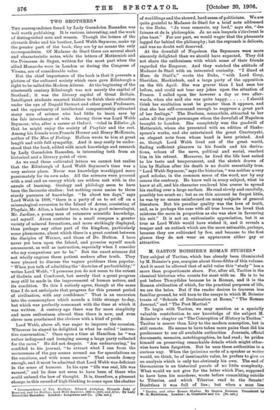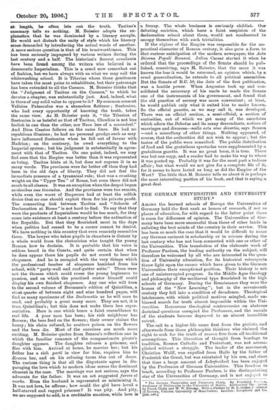M. GASTON BOISSIER'S ROMAN STUDIES.* THE subject of Tacitus, which
has already been illuminated by M. Boissier's pen, occupies about three-fifths of this volume. And it must be allowed that of solid value this " study " has a more than proportionate share. For, after all, Tacitus is the classical historian who counts for most with us. He is to be put before Thucydides because he is Roman, and it is the Roman civilisation of which, for the practical purposes of life, we are the heirs. But if the reader desires to traverse less familiar ground, he will turn to the essays in which M. Boissier treats of "Schools of Declamation at Rome," "The Roman Journal," and "The Poet Martial."
To begin with Tacitus, we may mention as a specially valuable contribution to our knowledge of the subject M. Boissier's chapter on" The Conception of History in Tacitus." Tacitus is nearer than Livy to the modern conception, but is still remote. He seems to have taken more pains than did his predecessor to use all available authorities. Journals, official documents, memoirs, autobiographies, he had read ; he prides himself on preserving remarkable details which might other- wise have been forgotten. But he uses these authorities in a curious way. When the ipsissima verba of a speaker or writer would, we think, be of inestimable value, he prefers to give us an analysis which is only too obviously his own. The end of Germanicus is an historical puzzle of no little complexity. What would we not give for the letter which Piso, supposed to have been his murderer, wrote before committing suicide to Tiberius, and which Tiberius read to the Senate! Doubtless it was full of lies ; but when a man lies
• reedits, and other Roman Studies. By Gaston Boisaier. Tranalated by W. G. Hutchison. London A. Constable and Co. [Os. net. j at length, he often lets out the truth. Tacitus's summarm tells us nothing. M. Boissier adopts the ex- planation that he was dominated by a literary scruple. He would not disturb the unity of style which his literary sense demanded by introducing the actual words of another. A more serious question is that of his trustworthiness. This has been seriously impugned by various writers during the last century and a half. The historian's fiercest assailants have been found: among the writers who believed in a democratic Imperialism. This is a creed now somewhat out of fashion, but we have always with us what we may call the whitewashing school. It is Tiberius whom those gentlemen have taken the most pains to rehabilitate, but their patronage has been extended to all the Caesars. M. Boissier thinks that the "Judgment of Tacitus on the Caesars," to which he devotes a chapter, was substantially just. And, indeed, what is there of any solid value to oppose to it ? By common consent Velleins Paterculus was a shameless flatterer ; Suetonius, who had every opportunity of knowing the truth, takes the same view. As M. Boissier puts it, "the Tiberius of Suetonius is as hateful as that of Tacitus, Claudius is not less foolish in one than the other, nor Nero leas of a scoundrel." And Dion Cassius follows on the same lines. He had no republican illusions ; he had no personal grudge such as may have influenced Suetonius when he fell out of favour with Hadrian ; on the contrary, he owed everything to the Imperial system; but his judgment is substantially in agree- ment with that of Tacitus. On one point, indeed, we may feel sure that the Empire was better than it was represented as being. Tacitus hints at it, but does not express it in so many words. The provinces were far better off than they had been in the old days of liberty. They did not feel the immediate pressure of a tyrannical rule; that was a crushing weight on the "Upper Ten" of Rome, but even there did not reach to all classes. It was an exception when the despot began cerdoni bus ease timendus. And the provinces were too remote, while even the worst of Emperors had at least the selfish desire that no one should exploit them for his private profit. The connecting link between Taoitus and "Schools of Declamation at Rome" is not hard to find. To say that they were the products of Imperialism would be too much, for they came into existence at least a century before the extinction of the Republic. But that they flourished most in the days when politics had ceased to be a career cannot be denied. We have nothing in this country that even remotely resembles them. The lawyer who takes pupils in chambers is distant by a whole world from the rhetorician who taught the young Roman how to declaim. It is probable that his voice is seldom heard in the Courts, and quite certain that when he does appear there his pupils do not crowd to hear his eloquence. And he is occupied with the very things which the professional teacher of eloquence banished from his school, with "party-wall and roof-gutter suits." These were not the themes which could rouse the young beginners to passion, and on which the practised orator himself could display his own finished eloquence. Any one who will turn to the second volume of Burmatufs edition of Quintilian, a stout quarto• of between eight and nine hundred pages, will find as many specimens of the Declamatio as he will care to read, and probably a great many more. They are not, it is true, Quintilian's ; but this does not make them less repre- sentative. Here is one which bears a faint resemblance to real life. A poor man has bees; his rich neighbour has flowers; the bees feed on the flowers ; their owner claims the honey; his claim refused, he scatters poison on the flowers and the bees die. Most of the exercises are much more exciting. M. Boissier quotes from Seneca's collection one in which the familiar romance of the compassionate pirate's daughter appears. The daughter releases a prisoner, and flies with him. Arrived at home, he marries her; but his father has a rich parti in view for him, requires him to divorce her, and on his refusing turns him out of doors. The curious thing is that all the disputants agree in dis- paraging the love which to modern ideas seems the dominant element in the case. The marriage was not serious, says the advocate for the father. It was an act suggested furore et =orb°. Even the husband is represented as minimising it. It was not love, he affirms ; how could the girl have loved a half-starved and ragged prisoner ? It was pity. And pity, we are supposed to add, is a creditable emotion, while love is a frenzy. The whole business is curiously. ohildish. Our debating societies, which, have a faint suspicion, of the declamation school about them, would not oondescend to occupy themselves with such trivialities.
If the regime of the Empire was responsible for the un- practical character of Roman oratory, it also gave a form to that curious anticipation of the modern newspaperi the Acta Marna Populi Romani. Julius Caesar started it when he ordered that the proceedings of the Senate should be pub- lished, conceiving, says M. Boissier, that the more it was known the less it would be esteemed, an opinion which, by a cruel generalisation, he extends to all political assemblies, But the Senate of B.C. 59, the date of the first publication, was a hostile power. When Augustus took up and con- solidated the autocracy of his uncle he made the Senate one of the instruments of his government, and found that the old practice of secrecy was more convenient; at least, he would publish only what it suited him to make knowni So the official gazette, as we may call it, was developed. There was an official section, a semi-official, a section of curiosities, out of which we get many of the anecdotes which adorn the Delectus and its many descendants, notices of marriages and divorces—nulla acts sine divortio, says Seneca —and a miscellany of other things. Nothing appeared, of course, that the authorities did not wish to appear ; but the tastes of the public were consulted. The public distribution of food and the gratuitous spectacles were supplemented by a gratuitous gazette. It was no great boon, it is true. There was but one copy, and a reader had to make his way to where it was posted up. Probably it was for the most part a tedious affair ; but what would we not give for a complete file of it, for it seems to have lasted as long as did the Empire of the West? The little that M. Boissier tells us about it is perhaps the most interesting portion of his book, and that is saying a great deal.















































 Previous page
Previous page